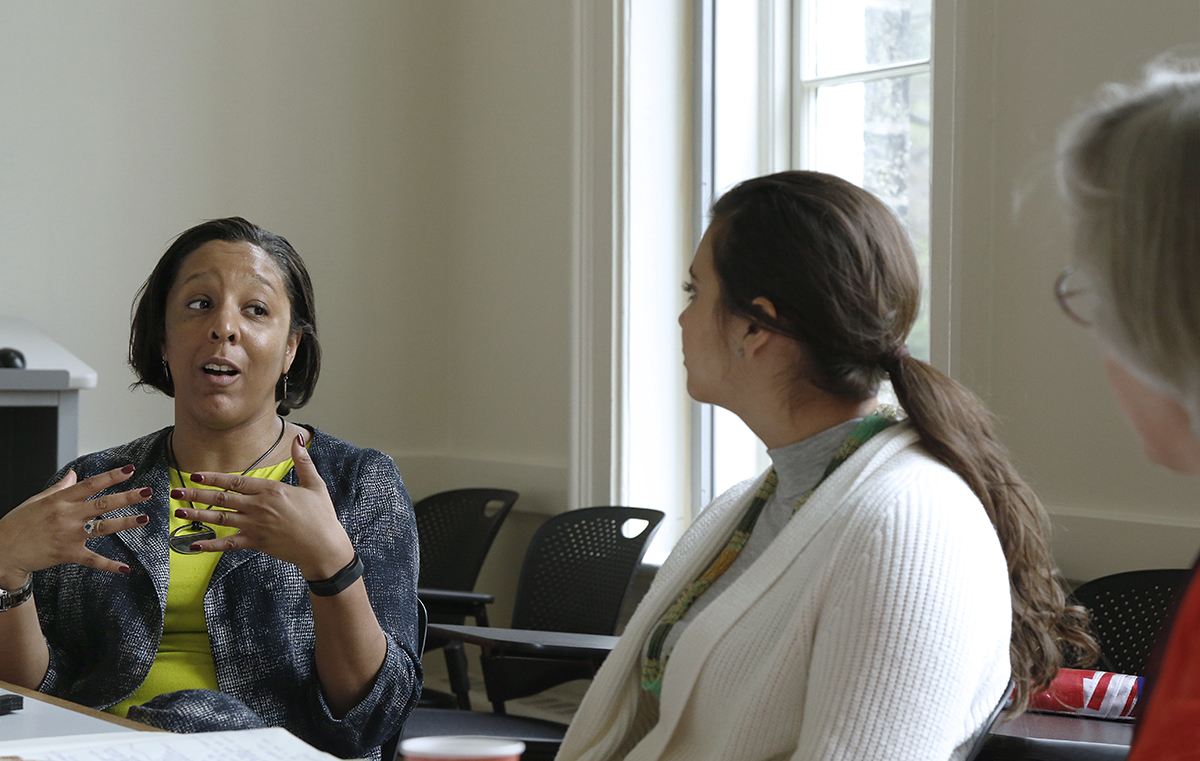Alumna Lynn Ross details career path to housing policymaker
By Daniel Aloi

A policymaker advocating for affordable housing and better communities, Lynn M. Ross, MRP ’01, has worked in nearly every aspect of planning, from zoning to redevelopment and workforce housing.
“Planning is an incredibly dynamic field and that’s what makes it exciting,” she said in a career talk, “How I Got from Here to There: A Story of 1 Planner, 2 Degrees, 3 Cities, 14 Years, and Lots of Fun,” April 22 in Milstein Hall.
Appointed by President Obama in 2014, Ross is deputy assistant secretary for policy development at the U.S. Department of Housing and Urban Development (HUD). Working in the Office of Policy Development and Research (HUD’s think tank), she leads a 23-member team engaged in policy development, related evidence-based research and data analysis, and disseminating policy findings.
She’s been interested in housing and urban studies since her childhood in Joliet, Illinois.
“One thing my family would do frequently is take the train into Chicago. And we could see from the train the old Robert Taylor Homes,” a massive, run-down public housing project that was torn down years later, she said. “That was very different from what I grew up with or what I knew. And that, at a very early age, got me thinking about the importance of place, and housing, and life outcomes – but also just very basically, what you have access to. It sort of lit that initial fire in me.”
She entered Iowa State University as an architecture major, took an elective course in planning, “absolutely loved it, and changed my major at the end of first semester,” she said. “Planning just felt like the right nexus of all the things I was interested in.”
Ross took internships while at Iowa State and her post-graduation plans shifted away from public sector planning work.
“I had a desire to continue learning about the field; that’s why I came to Cornell,” she said. “I arrived here in August of 1999, I was 21 years old, and I had some really key experiences here that have shaped my career.”
She discovered she had a passion for research – and, along with her coursework, her background, and her work with former Savannah, Georgia, assistant city manager Henry Moore, who had come to Cornell as a colloquium speaker, “this all led to the lightbulb moment – the work that I wanted to do as a planner,” she said.
In concert with applied research, writing and outreach oriented to practitioners, “I wanted to work with decision-makers and policymakers and help them to make more informed choices, with the goal of more inclusive organizations and communities.”
However, she said, “I didn’t know what this would look like as a job.”
“Your work is about your mission and your passion as a planner,” she said. “Whatever your discipline is, there’s a reason that you chose to study that, something in your history, something that is driving you. Your work is bigger than any particular job. This revelation while I was here at Cornell of the work that I wanted to do really has become a compass for me that has directed me throughout my career.”
After Cornell, Ross joined the American Planning Association (APA) research department in Chicago and led the APA’s advisory services for planners nationwide. “Substantively, I got to go deeper in lots and lots of planning issues,” she said. “We were doing work in housing and community development, tribal transportation, land use – you name it.”
Wanting “to go deeper on housing,” in 2007 she joined the National Housing Conference (NHC) and the Center for Housing Policy in Washington, D.C. As a director she helped build NHC’s new program of state and local initiatives while the national mortgage foreclosure crisis unfolded. She served as chief operating officer of the two related organizations before becoming executive director of the Urban Land Institute’s Terwilliger Center for Housing.
Her work there, on research and policy “to support developing mixed-use communities with housing choices affordable to families across a range of incomes,” was ideally suited to her, she said; she hesitated at first when HUD offered her a position.
“It was a new challenge, an opportunity to explore my work – which had been very state and local focused – at the federal level,” she said. “One of the things I’ve always appreciated about being a planner, is that I feel that there’s a lot more for me to explore and learn.”
Ross also led a talkback with College of Architecture, Art and Planning students following her talk.
Media Contact
Get Cornell news delivered right to your inbox.
Subscribe